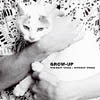 As part of a campaign to reissue the neglected discography of Manchester post-punk label Object Music, LTM's Boutique Label presents this collection of the entire recorded output of Grow Up, the project of Spherical Objects guitarist and Manchester Musicians Collective member John Bisset-Smith. A six-piece featuring brass and woodwinds, Grow Up combines stripped-down, youthful pop-punk with sophisticated chamber pop and hints of Beefheartian skronk.
As part of a campaign to reissue the neglected discography of Manchester post-punk label Object Music, LTM's Boutique Label presents this collection of the entire recorded output of Grow Up, the project of Spherical Objects guitarist and Manchester Musicians Collective member John Bisset-Smith. A six-piece featuring brass and woodwinds, Grow Up combines stripped-down, youthful pop-punk with sophisticated chamber pop and hints of Beefheartian skronk.
Perhaps all too aware of their obscurity, the liner notes by LTM's James Nice go out of their way to connect John Bisset-Smith and Grow Up to the lively Manchester scene in the late 1970s, playing up the MMC connection as a way to drop some famous names: Joy Division, The Passage, Crispy Ambulance, etc. Perhaps this kind of name-dropping is inevitable, but it seems unfortunate in the case of Grow Up, who possess an idiosyncratic sound that seems to have been conceived largely in a state of obvliousness about their contemporaries, both temporally and geographically. I can't think of anything else that sounds quite like Grow Up. Though all of the elements in isolation aren't unique, taken together they add up to a strange hybrid that is intriguing, eminently listenable, and hints at greater things to come (which unfortunately never materialized).
Although both of the band's full-length albums received positive reviews from the British press at the time of their release—Paul Morley of NME enthusing that the band's "ingenious, sax-propelled chamber pop" was "brilliant" and "extremely commercial"—the albums did not sell terribly well, and the band remained obscure. This was partly due to the vagaries of independent music at their particular time and place, and partly due to the sudden closure of the Object Music label, which left the band responsible for all promotion and distribution of their sophomore album. However, I don't quite hear an unjustly obscure lost treasure when I listen to the music collected on this two-disc set. What I hear is a band with an overdose of ambition; a series of false starts and isolated moments of greatness, shot through with a youthful ambition that carries it off even when the songs themselves are callow.
I am a sucker for a particularly well-conceived short song. There is something about the restraint and cleverness required to write a memorable song that clocks in at under three minutes that impresses me. Grow Up have several of these tiny gems scattered across the two albums, seven-inch singles, compilation and demo tracks that comprise this collection. The title track of the band's debut The Best Thing comes early and is perhaps the best single song the band recorded, a miniature masterpiece of vibrant, slapdash, hyperactive post-punk. Bisset-Smith fills each line with verbiage, often running well past the end of a measure. The effect is reminiscent of high school poetry, cramming too many words into each line, a glut of emotions spilling out. The horns, reeds and guitars swarm around each phrase with a glorious lack of precision, as if each song were rehearsed only once before pressing record. Other winners include the narrative "Dear Isobel," an odd rockabilly-esque song addressed to the titular punk girl, the plea of a young rebel and ne'er-do-well to an out-of-reach girl who meets an untimely and tragic end. Steven Westwood's trombone is particularly successul at carrying the song's melody, which continues seamlessly into the next song "Do You Want To Dance," suggesting that Bisset-Smith conceived the album as a coherent whole, rather than a series of songs.
Without Wings is a worthy follow-up, evidencing a maturing in the band's sound, but also less of the messy impulsiveness of the debut. Bisset-Smith's vocals are often effected with superfluous reverb that unecessarily adds a distance to the intimate lyrics. Also, the band's accuracy has improved, complex arrangements turning on a dime. Even though some of the loose charm is gone, there are still many highlights on the album. More terse pop gems in the bratty "Becoming" and the funky "Flying Fish." "The Boy" is a standout track, a sad and quirky story-song that moves through several different movements with ease, making poignant use of call-and-response vocals. Songs like this one could easily fit in on the Cherry Red label; bands like The Monochrome Set and Everything But the Girl; they are witty, musically complex but also breezy and lightweight. The sophomore album also demonstrates more of the band's affection for 1950s rockabilly and the burgeoning neo-swing jazz sound, influences which haven't aged particularly well, but Bisset-Smith and co. make the most of it on tracks such as "The Hypnotist" and "The Double Act." The instrumental track "GGGDADGADADAD," drawn from a seven-inch released in 1980, shows the band at its most prankish, the literalism of the title provoking an amazing stop/start, stuttering Beefheart-ian jam.
The collection ends with a pair of unreleased studio demo recordings—the last made by the group before they disbanded—which offer tantalizing hints at future iterations which were never to materialize. "Do Choose" lacks the horns which characterize the rest of Grow Up's output, though it still contains a seemingly effortless pop hook. "Black Cat Is Back" is psychedelic, alliterative beat poetry recited against dislocated guitar and flute with a field recording of a child talking the background. How this material might have slotted into a third album is anyone's guess, and a question that will never be answered. Although the LTM demographic is generally the intrepid listener of post-punk rarities, Grow Up seems to evade ghettoization, making music that has appeal well outside this obsessive coterie.
samples:

